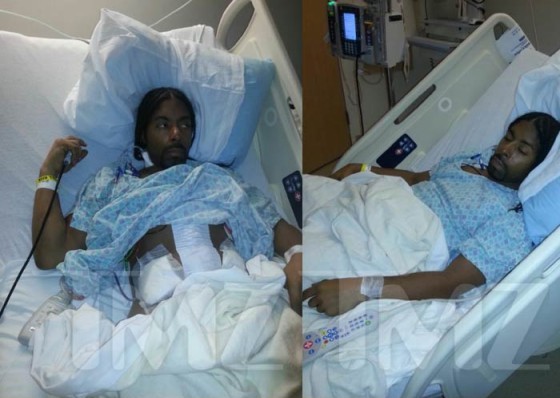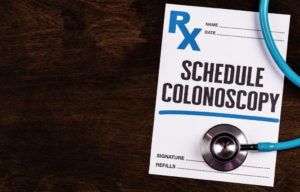
It's been nearly 10 years since we lost reality star Ahmad Givens. Better known as "Real", one of the stars of VH1's Real Chance of Love, died after a long battle with cancer in 2015. He was only 33 years old. According to his brother, Kamaal aka "Chance" from the same show shares what happened to his seemingly healthy brother.
Chance says the reality star's condition worsened after he took a fall in January of 2015. After that, Real was bedridden ever since.
Givens was first diagnosed with Stage 4 Colon Cancer in 2013.
MUST READ: A New Simple Test For Colon Cancer
"I remember I was laying on the hospital bed and the doctor came in crying and when I saw her crying I knew it was something serious," Real said of the moments before he was informed that he had stage 4 colon cancer that had spread to his liver. "My doctors thought I had, like, three days to live so they just zapped me with chemo. I left out of there with my veins burning and everything."
African Americans have the highest death rate and shortest survival of any racial and ethnic group in the US for most cancers. Men and women are equally likely to die from colon cancer, but men are more likely to be diagnosed with colon cancer than women of the same age.

In the early stages, colon cancer begins with small polyps, which are shaped like little mushrooms growing on the wall of the colon. Polyps are very common, especially as people get older. Not all polyps develop into cancer but all colorectal cancer begins with polyps.
Certain kinds of polyps are more likely to lead to cancer than others, but the doctor can’t tell if a polyp is precancerous just by looking at it. This is why many doctors remove and analyze any polyp found during screening. Polyps can be identified and removed by colonoscopy, in which a small camera on a flexible tube is inserted into the rectum.
Givens said after surgery, tumors began form and spread to the left side of his brain, leaving him partially paralyzed on the right side of his body.
"I had to learn how to walk again and everything," explained Givens, who said that radiation successfully eradicated the brain tumor. "I just have faith in God, man."
 Givens broke into reality TV through the 2007 VH1 dating show I Love New York, which he appeared on with brother Kamal "Chance" Givens. He went on to star in spinoffs Real Chance of Love from 2008 to 2009 and Real & Chance: The Legend Hunters in 2010.
Givens broke into reality TV through the 2007 VH1 dating show I Love New York, which he appeared on with brother Kamal "Chance" Givens. He went on to star in spinoffs Real Chance of Love from 2008 to 2009 and Real & Chance: The Legend Hunters in 2010.
One of the things his brother tries to get across to everyone is the need for men to go to the doctor and get tested for prostate cancer. It's important that Black Men especially get tested for it, but also remember that Black women need to be tested as well.
As with other types of cancer, African Americans need to be screened earlier than the general population. Early detection is key. Ahmad was tested and shortly after was diagnosed with STAGE 4 colon cancer! But had it been at Stage 1, who knows what would have happened or if it could have extended his life.
Our hearts go out to Real's brother Chance and their loved ones, we'll truly miss this member of the VH1 family.
Chance posted a tribute to his brother online saying, "I'll see you one day soon we shall dance again in God's kingdom forever and ever bro words can't describe my pain world pray for me!"
For a full slideshow of Ahmad "Real" Givens' journey,
Don't ASSume: Why Colon Cancer Is Killing More Black People
 African Americans have the highest mortality rates from colorectal cancer of any ethnic group in the United States – 40 percent higher than those of whites. Yet screening for colorectal cancer in the African American community has increased at a much slower rate compared to other groups. Why is this the case?
African Americans have the highest mortality rates from colorectal cancer of any ethnic group in the United States – 40 percent higher than those of whites. Yet screening for colorectal cancer in the African American community has increased at a much slower rate compared to other groups. Why is this the case?
“African-Americans are more likely to get colon cancer, they’re more likely to have an advanced stage of disease when they’re diagnosed with colon cancer, they’re more likely to die from colon cancer and they have shorter survival after diagnosis with colon cancer,” said Dr. Darrell Gray II, Medical Director, Endoscopy and Gastroenterology Services at Ohio State University and Colorectal Cancer Alliance spokesperson.
He said there are many factors that come into play regarding this issue.
“In my experience speaking with patients and interacting with Black people in my community, they are often afraid of colonoscopies and resent the notion of having a foreign device go up their behind,” Dr. Gray said. “ There’s also the issue of having no insurance coverage to pay for the screenings or treatments needed if they’re diagnosed.”
Phalon Ervin can attest to this. The 37-year-old single mother self-diagnosed her painful bowel and stomach symptoms as colorectal cancer when she was just 28 but didn’t seek treatment because she had no insurance coverage.
“I was experiencing all of the big symptoms of the cancer: bloating, fatigue, rectal bleeding, involuntary weight loss and stool changes,” she said. “After a quick Google search, I knew I had colorectal cancer.”
As a new college graduate, a mother and temp worker, she said she was more concerned about spending as much time with her child as she could instead of seeking time-consuming treatments and racking up medical debt.
“Looking back, I actually can’t believe that this was my pattern of thinking, but I had no money and no viable job options, nevertheless insurance; I knew that I was already dying anyway, so I wanted to spend the little bit of time I had left of my life with my child.”
Fortunately, she didn’t have to choose between her life and time with her son. Not too long after the self-diagnosis, she was able to secure a full-time job with health benefits and received an official diagnosis and treatment.
“I underwent chemotherapy and now, almost ten years later I’m still cancer-free.”
With us coming on the heels National Colorectal Cancer Awareness Month in March, both Dr. Gray and Phalon are urging Black people to take their health into their own hands with help of the ‘Don’t ASSume’ campaign.
“Don’t die from embarrassment,” said Dr. Gray. “Through this campaign, I want to encourage people to take their health in their own hands by proactively getting screenings, inquiring about your family health history and putting your pride to the side--get the colonoscopy.”
Colorectal Cancer Alliance and their recently launched a campaign “Don’t ASSume” uses humor and provocative imagery to challenge assumptions about colorectal cancer. The goal is to increase awareness, encourage screening, and help end colorectal cancer in our lifetime.
For more information, please visit https://www.ccalliance.org/about/awareness-month

Jasmine Browley holds an MA in journalism from Columbia College Chicago, and has contributed to Ebony, Jet and MADE Magazine among others. So, clearly, she knows some stuff. Follow her digital journey @JasmineBrowley.








